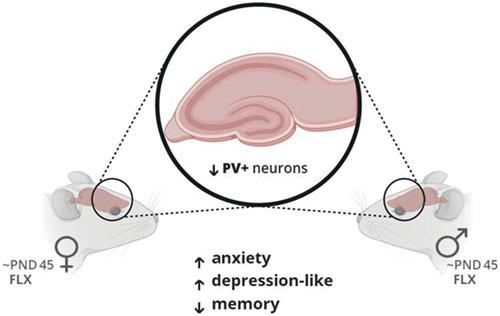当前位置:
X-MOL 学术
›
Int. J. Dev. Neurosci.
›
论文详情
Our official English website, www.x-mol.net, welcomes your feedback! (Note: you will need to create a separate account there.)
Postnatal exposure to fluoxetine led to cognitive-emotional alterations and decreased parvalbumin positive neurons in the hippocampus of juvenile Wistar rats
International Journal of Developmental Neuroscience ( IF 1.8 ) Pub Date : 2021-07-01 , DOI: 10.1002/jdn.10139 Ywlliane da Silva Rodrigues Meurer 1, 2, 3 , Sara Sophia Guedes Linhares 3 , Alvaro da Costa Lima 2 , Antonio Carlos Queiroz de Aquino 3 , Luiz Eduardo Mateus Brandão 4 , Diana Aline Nôga 5 , Clarissa Loureiro das Chagas Campelo 3 , Ramon Hypólito Lima 6 , Jeferson de Souza Cavalcante 3 , Rovena Clara Galvão Januário Engelberth 3 , Alessandra Mussi Ribeiro 7 , Regina Helena Silva 1
International Journal of Developmental Neuroscience ( IF 1.8 ) Pub Date : 2021-07-01 , DOI: 10.1002/jdn.10139 Ywlliane da Silva Rodrigues Meurer 1, 2, 3 , Sara Sophia Guedes Linhares 3 , Alvaro da Costa Lima 2 , Antonio Carlos Queiroz de Aquino 3 , Luiz Eduardo Mateus Brandão 4 , Diana Aline Nôga 5 , Clarissa Loureiro das Chagas Campelo 3 , Ramon Hypólito Lima 6 , Jeferson de Souza Cavalcante 3 , Rovena Clara Galvão Januário Engelberth 3 , Alessandra Mussi Ribeiro 7 , Regina Helena Silva 1
Affiliation

|
The exposure to selective serotonin reuptake inhibitors (SSRIs) during development results in behavioural impairment in adulthood in humans and animal models. Indeed, serotonergic overexpression in early life leads to structural and functional changes in brain circuits that control cognition and emotion. However, the effects of developmental exposure to these substances on the behaviour of adolescent rats are conflicting and remain poorly characterised. We performed a behavioural screening to investigate the effects of postnatal exposure to fluoxetine on memory and behaviours related to anxiety, anhedonia, and depression, as well we evaluate the parvalbumin expression in hippocampus of juvenile (~PND45) female and male rats. Fluoxetine (daily 20 mg/kg s.c. injections from PND7-PND21)- or vehicle-treated adolescent rats went through several behavioural tasks (from PND 38 to PND52) and were subject to transcardial perfusion and brain removal for immunohistochemical analysis (PND53). We found that postnatal exposure to fluoxetine increased anxiety- and depression-like behaviours in the open field and sucrose preference and forced swimming tests, respectively. In addition, this treatment induced working memory and short-term (but not long-term) recognition memory impairments, and reduced parvalbumin-positive interneurons in the hippocampus. In addition, the results revealed developmental sex-dependent effects of fluoxetine postnatal treatment on adolescent rats' behaviour. These outcomes indicate that affective disorders and mnemonic alterations caused by SSRIs perinatal exposure can be present at adolescence.
中文翻译:

产后氟西汀暴露导致幼年 Wistar 大鼠海马的认知情绪改变和小白蛋白阳性神经元减少
在发育过程中暴露于选择性血清素再摄取抑制剂 (SSRIs) 会导致人类和动物模型在成年期出现行为障碍。事实上,生命早期的血清素过度表达会导致控制认知和情绪的大脑回路发生结构和功能变化。然而,发育性暴露于这些物质对青春期大鼠行为的影响是相互矛盾的,并且特征仍然很差。我们进行了一项行为筛查,以研究产后暴露于氟西汀对与焦虑、快感缺乏和抑郁相关的记忆和行为的影响,并评估幼年 (~PND45) 雌性和雄性大鼠海马中的小白蛋白表达。氟西汀(每日 20 mg/kg sc 来自 PND7-PND21) 或载体处理的青春期大鼠的注射经历了几项行为任务(从 PND 38 到 PND52),并进行了经心灌注和脑切除以进行免疫组织化学分析 (PND53)。我们发现,产后暴露于氟西汀分别增加了旷野和蔗糖偏好和强迫游泳测试中的焦虑和抑郁样行为。此外,这种治疗诱导了工作记忆和短期(但不是长期)识别记忆障碍,并减少了海马中的小白蛋白阳性中间神经元。此外,结果揭示了氟西汀产后治疗对青春期大鼠行为的发育性别依赖性影响。
更新日期:2021-07-01
中文翻译:

产后氟西汀暴露导致幼年 Wistar 大鼠海马的认知情绪改变和小白蛋白阳性神经元减少
在发育过程中暴露于选择性血清素再摄取抑制剂 (SSRIs) 会导致人类和动物模型在成年期出现行为障碍。事实上,生命早期的血清素过度表达会导致控制认知和情绪的大脑回路发生结构和功能变化。然而,发育性暴露于这些物质对青春期大鼠行为的影响是相互矛盾的,并且特征仍然很差。我们进行了一项行为筛查,以研究产后暴露于氟西汀对与焦虑、快感缺乏和抑郁相关的记忆和行为的影响,并评估幼年 (~PND45) 雌性和雄性大鼠海马中的小白蛋白表达。氟西汀(每日 20 mg/kg sc 来自 PND7-PND21) 或载体处理的青春期大鼠的注射经历了几项行为任务(从 PND 38 到 PND52),并进行了经心灌注和脑切除以进行免疫组织化学分析 (PND53)。我们发现,产后暴露于氟西汀分别增加了旷野和蔗糖偏好和强迫游泳测试中的焦虑和抑郁样行为。此外,这种治疗诱导了工作记忆和短期(但不是长期)识别记忆障碍,并减少了海马中的小白蛋白阳性中间神经元。此外,结果揭示了氟西汀产后治疗对青春期大鼠行为的发育性别依赖性影响。


























 京公网安备 11010802027423号
京公网安备 11010802027423号